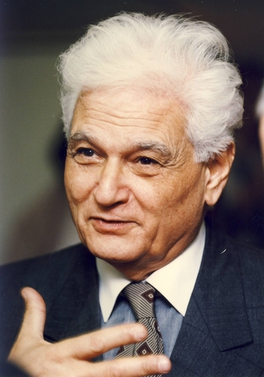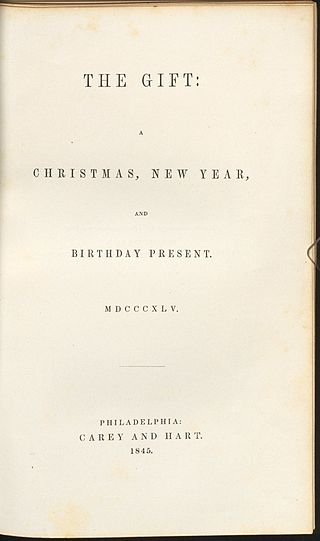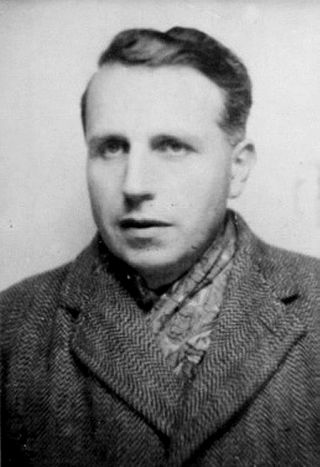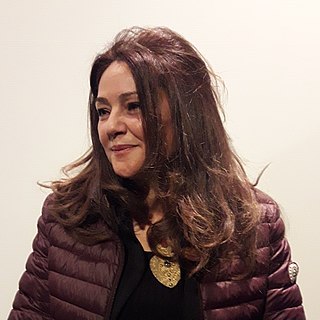
Jacques Derrida was a French philosopher. He developed the philosophy of deconstruction, which he utilized in a number of his texts, and which was developed through close readings of the linguistics of Ferdinand de Saussure and Husserlian and Heideggerian phenomenology. He is one of the major figures associated with post-structuralism and postmodern philosophy although he distanced himself from post-structuralism and disowned the word "postmodernity".

"The Purloined Letter" is a short story by American author Edgar Allan Poe. It is the third of his three detective stories featuring the fictional C. Auguste Dupin, the other two being "The Murders in the Rue Morgue" and "The Mystery of Marie Rogêt". These stories are considered to be important early forerunners of the modern detective story. It first appeared in the literary annual The Gift for 1845 (1844) and soon was reprinted in numerous journals and newspapers.

Hélène Cixous is a French writer, playwright and literary critic. During her academic career, she was primarily associated with the Centre universitaire de Vincennes, which she co-founded in 1969 and where she created the first centre of women's studies at a European university. Known for her experimental writing style and great versatility as a writer and thinker, she has written more than seventy books dealing with multiple genres: theatre, literary and feminist theory, art criticism, autobiography and poetic fiction.

Georges Albert Maurice Victor Bataille was a French philosopher and intellectual working in philosophy, literature, sociology, anthropology, and history of art. His writing, which included essays, novels, and poetry, explored such subjects as eroticism, mysticism, surrealism, and transgression. His work would prove influential on subsequent schools of philosophy and social theory, including poststructuralism.

Lou Andreas-Salomé was a Russian-born psychoanalyst and a well-traveled author, narrator, and essayist from a French Huguenot-German family. Her diverse intellectual interests led to friendships with a broad array of distinguished thinkers, including Friedrich Nietzsche, Sigmund Freud, Paul Rée, and Rainer Maria Rilke.

Jean Paul Gustave Ricœur was a French philosopher best known for combining phenomenological description with hermeneutics. As such, his thought is within the same tradition as other major hermeneutic phenomenologists, Martin Heidegger, Hans-Georg Gadamer, and Gabriel Marcel. In 2000, he was awarded the Kyoto Prize in Arts and Philosophy for having "revolutionized the methods of hermeneutic phenomenology, expanding the study of textual interpretation to include the broad yet concrete domains of mythology, biblical exegesis, psychoanalysis, theory of metaphor, and narrative theory."
Luce Irigaray is a Belgian-born French feminist, philosopher, linguist, psycholinguist, psychoanalyst, and cultural theorist who examines the uses and misuses of language in relation to women. Irigaray's first and most well known book, published in 1974, was Speculum of the Other Woman (1974), which analyzes the texts of Freud, Hegel, Plato, Aristotle, Descartes, and Kant through the lens of phallocentrism. Irigaray is the author of works analyzing many thinkers, including This Sex Which Is Not One (1977), which discusses Lacan's work as well as political economy; Elemental Passions (1982) can be read as a response to Merleau‐Ponty's article “The Intertwining—The Chiasm” in The Visible and the Invisible, and in The Forgetting of Air in Martin Heidegger (1999), Irigaray critiques Heidegger's emphasis on the element of earth as the ground of life and speech and his "oblivion" or forgetting of air.
Philippe Lacoue-Labarthe was a French philosopher. He was also a literary critic and translator. Lacoue-Labarthe published several influential works with his friend Jean-Luc Nancy.
This is a list of writings and other compositions by Friedrich Nietzsche.

François Laruelle is a French philosopher, formerly of the Collège international de philosophie and the University of Paris X: Nanterre. Laruelle has been publishing since the early 1970s and now has around twenty book-length titles to his name. Alumnus of the École normale supérieure, Laruelle is notable for developing a science of philosophy that he calls non-philosophy. He currently directs an international organisation dedicated to furthering the cause of non-philosophy, the Organisation Non-Philosophique Internationale.

Nietzsche contra Wagner; Out of the Files of a Psychologist is a critical essay by Friedrich Nietzsche, composed of selections he chose from among his earlier works. The selections are assembled in this essay in order to focus on Nietzsche's thoughts about the composer Richard Wagner. As he says in the preface, when the selections are read "one after the other they will leave no doubt either about Richard Wagner or about myself: we are antipodes." He also describes it as "an essay for psychologists, but not for Germans". It was written in his last year of lucidity (1888–1889), and published by C. G. Naumann in Leipzig in 1889. Nietzsche describes in this short work why he parted ways with his one-time idol and friend, Richard Wagner. Nietzsche attacks Wagner's views, expressing disappointment and frustration in Wagner's life choices. Nietzsche evaluates Wagner's philosophy on tonality, music and art; he admires Wagner's power to emote and express himself, but largely disdains what the philosopher deems his religious biases.
Quentin Meillassoux is a French philosopher. He teaches at the Université Paris 1 Panthéon-Sorbonne.

Élisabeth Roudinesco is a French scholar, historian and psychoanalyst. She conducts a seminar on the history of psychoanalysis at the École Normale Supérieure.
Catherine Malabou is a French philosopher. She is a Professor at the Centre for Research in Modern European Philosophy (CRMEP) at Kingston University, at the European Graduate School, and in the department of Comparative Literature at the University of California, Irvine, a position formerly held by Jacques Derrida.

Naomi Schor was an American literary critic and theorist. A pioneer of feminist theory for her generation, she is regarded as one of the foremost scholars of French literature and critical theory of her time. Naomi's younger sister is the artist and writer Mira Schor.
Bereck Kofman was a French Hasidic orthodox rabbi, independent from the consistory, born in Poland, deported and murdered in Auschwitz.
Marguerite Derrida was a Czech-born French psychoanalyst. She translated many psychoanalytic works into French.

Fawzia Zouari, born 10 September 1955 in Dahmani, is a Tunisian writer and journalist.
Éditions Galilée is a French publishing house in Paris, and was founded in 1971 by Michel Delorme. It specializes in philosophy, French literature, arts and human sciences. Focusing on the deconstructionist thought of Jacques Derrida, Galilée also publishes works on postmodernist thought.

Élizabeth Herrgott was a French writer who specialized in erotic and pornographic material.












